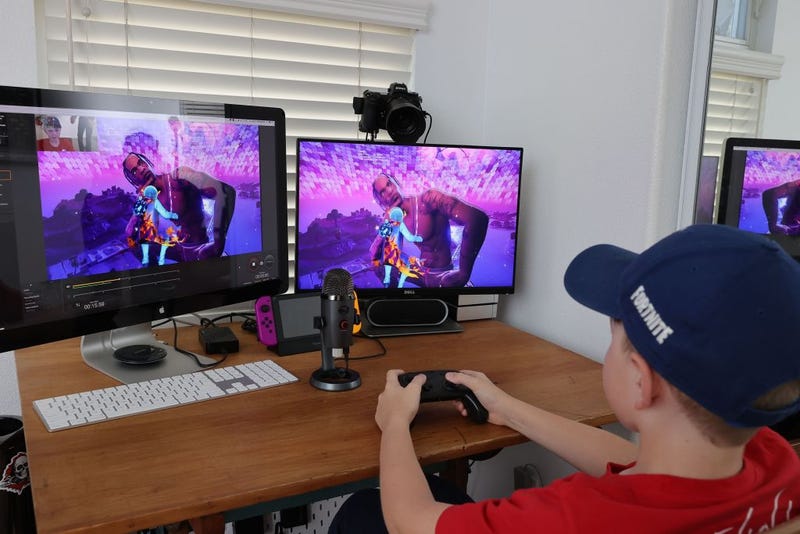
A class-action lawsuit claims that Fortnite is addictive and harmful to children.
The suit was filed in Canada on behalf of two parents who claim their kids play the game compulsively -- causing them to suffer panic attacks, withdraw from family, and spend money on in-game currency. The parents claim the game has caused their children to suffer psychological, physical and financial harm.
The lawsuit dates back to 2019, but was recently approved by a Canadian judge.
The parents, whose children started playing the game when they were 9 and 13 years-old, accuse developer Epic Games of deliberately and knowingly creating Fortnite to be "the most addictive game possible."
"Addiction to the Fortnite game has real consequences on the lives of players, many of whom have developed problems such as not eating, not showering, and not socializing," the lawsuit states. "The effects of video game addiction, including Fortnite, on the brains of children is particularly damaging... Specialists report gaps in vocabulary as well as gaps in social integration. Indeed, it is recognized that the continued use of electronic devices causes significant changes to the prefrontal cortex of the human brain, changes that particularly affect young developing brains."
The lawsuit claims the addictive aspect of Fortnite is "recognized worldwide and has also been compared to heroin... forcing kids into video-game rehab."
Fortnite is a cooperative shooting and survival video game that allows up to 100 people to play in increasingly restricted spaces until all but one player or team is eliminated. The duration of a game varies according to its progress, and can be of a maximum duration of approximately 20 minutes. As of 2019, the game had over 250 million players worldwide.
Although Fortnite is offered for free download, players are invited to make in-app purchases. The lawsuit claims that Fortnite recorded record profits estimated at nearly $2.4 billion worldwide in 2018.
The lawsuit alleges that the game "cultivates the appeal of exclusivity among users by offering limited-edition items that are available for a short period of time," which "encourages excessive spending since, in the heat of the moment, players spend without counting."
The suit notes that the game offers different challenges each day, giving rise to rewards, which are doubled on weekends, and changes every ten weeks "which pushes the player to start over and therefore continue to play to accumulate other rewards."
"A well-calculated element of luck helps to cement the addictive aspect since it is difficult to stop playing when our brain thinks good luck is about to smile upon us," the lawsuit states. "The defendants used the same tactics as the creators of slot machines, i.e. variable reward programs, to ensure the addiction of its users, the brain being manipulated to always desire more."
Children are particularly vulnerable to this manipulation, the lawsuit states, since their self-control system in the brain is not sufficiently developed.
"Fortnite has created, through its marketing, a vicious circle in which children must buy to feel accomplished and accepted by their peers, thus taking advantage of their vulnerable position," according to the lawsuit. "Defendants nurture a dream in children by dangling prizes and the prestige of winning in global competitions organized by Epic, including the Fortnite World Cup which offers over $30 million in prizes."
The parents claim that prior to playing Fortnite, their kids were well-behaved, socialized with friends in person and only occasionally played video games. After downloading Fortnite, both children became obsessed with the game and would get upset when their parents tried to limit their playing time. The lawsuit claims the children started to use "very aggressive and vulgar" language while playing the game and changed their social interactions, since they can network online and their friends no longer need to be present.
Additionally, the parents claim their children have spent their savings and any gifts of money they receive on buying in-game currency "to acquire cosmetic items such as character models, or even the game's battle pass and dances."
Both parents claim that had they been informed of the risks and dangers associated with the use of Fortnite, they never would have let their children download the game or at least would have been very vigilant about their child's playing time, particularly in the first months of use, in order to prevent an addiction to the game.
The lawsuit accuses Epic Games of creating Fortnite "with the clear intention of making it addictive and therefore ensuring that players spend as much money as possible while playing it, despite the fact that the game is offered for free for download." It also accuses Epic Games of "failing to disclose to users the risks and dangers associated with the use of Fortnite... including in particular the risk of addiction."
The suit points out that the the World Health Organization recognizes and classifies video game addiction, which it calls "Video Game Disorder", like a disease. It's defined as "a behavior related to the practice of video games or digital games, which is characterized by a loss of control over the game, an increased priority given to the game, to the point that it takes precedence over other interests and daily activities, and by continuing or increasing the practice of gambling despite harmful repercussions."
The lawsuit is seeking monetary relief for anyone who started playing Fortnite when they were under 13 years-old and who have made in-app purchases.
Epic Games called the claims meritless.
"We have industry-leading parental controls that empower parents to supervise their child's digital experience. Parents can receive playtime reports that track the amount of time their child plays each week, and require parental permission before purchases are made, so that they can make the decisions that are right for their family," spokesperson Nathalie Munoz said in a statement to CTV News. "We have also recently added a daily spending limit by default for players under the age of 13."
Munoz said Epic Games plans to fight the lawsuit in court.


